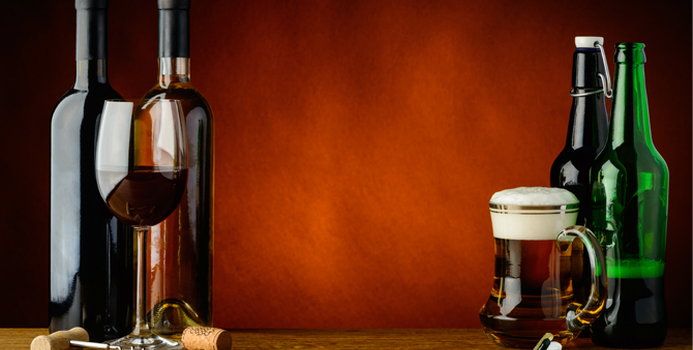Alcohol and health are not usually synonymous words, especially if one drink turns into four! Alcohol is a fermentation of sugars and starches and offers calories but essentially no nutrients. Moderation is key, as one drink is unlikely to affect your weight or health. But multiple that by three or more on a frequent basis and you can put your health at risk. Calories from alcohol can take up calories that could have been used to eat nutritious foods, putting people who are heavy drinkers at risk of poor nutrition and being overweight.
However there is some evidence that moderate drinking for middle aged and older adults may have some health benefits. Moderate drinking is defined as one drink for women and two drinks for men every day. Research into beneficial effects for heart health and increased appetite in older adults has been in support of moderate alcohol consumption.
Drink Equivalence (each equivalency contains .6 fluid ounces of pure ethanol)
- 12 fluid ounces of beer: ~150 calories
- 5 fluid ounces of wine: ~100 calories
- 1.5 fluid ounces of 80-proof distilled spirits: 100 calories
As a single drink, 100-150 calories is unlikely to make too much of a dent in your daily nutrition goals. But be careful, a six-pack of beer is 900 calories and 2 servings of wine before dinner daily can add up to a pound of fat in 2.5 weeks. When adding mixers to drinks you can quickly over consume your daily caloric needs!
So what are the best choices when you want to drink socially and minimize the negative caloric consumption of alcohol?
- Alternate alcoholic beverages with non-alcoholic choices like water or club soda.
- Decide prior to your outing how many alcoholic beverages you want to drink!
- Opt for your drinks neat, on the rocks or with a club soda mix.
- Select club soda water/seltzer water to avoid unnecessary sugar and added sodium. Regular soda, tonic water or energy drinks can add a lot of extra calories to your drinks. Diet soda can be another option.
- Use fruit juice with caution. Often the fruit juice, like cranberry juice, found in bars contains very little juice and is mostly sugar. Opt for fresh-squeezed or 100% fruit juice options to reduce added sugars and dilute with ice or water. When possible, use whole fruit for fiber, vitamins and minerals!
- Try simple syrup made from honey! It still adds additional calories to beverages, but because it is sweeter, you need less to flavor your drinks. Mix ½ tablespoon honey with ¾ tablespoon warm water to make simple syrup.
- Calorie content for beer can typically be gauged by color, lighter colored beer usually has fewer calories than darker beers.
- Make your own wine coolers! A typical wine cooler has about 180 calories versus a glass of white wine at about 100 calories. Add seltzer water and fresh berries to dilute your glass of wine for the same effect.
- Limit drinks that are creamy, chocolaty or are made of mostly liqueurs or cordials. At 160 calories per 1.5 oz, these choices can add up.
- Make your own Bloody Mary mix! Store bought options can include a lot of salt, fillers and calories. Use vegetable juice and start from there. Hot sauce, horseradish, Worcestershire sauces, spices and a full garden of vegetables in it can make this a filling and satisfying choice.
- Limit energy drink based malt alcohols, as these have a higher caloric content. Plus, the caffeine can decrease how much you feel the effects of alcohol, leading to overconsumption.
- Know that calories are not everything, and sometimes having one drink that is more flavorful will be more satisfying than multiple plain vodka sodas.
- Research your favorite mixers and make them at home from fresh ingredients like margaritas.
- Try frozen drinks! These typically take longer to drink and the extra water in them can be an added benefit.
- Learn to sip and not gulp your drinks -- there is no rush and enjoying the flavor of the drink should be a big part of it!
- Light beer has about 100 calories or less versus regular beer at 150 calories. Dark beer like stouts or porters have more calories but the density of them can be more satisfying and slow your drinking speed.
- Try drinks with ginger, hot sauce, lemons/limes, mint, vegetables, fresh fruits, and other similar ingredients for small vitamin, mineral and antioxidant benefits! White wine, red wine and beer all contain different types of antioxidants.
So while drinking in moderation can still add up over time, being aware and selective in your choices can help you manage the additional calorie consequences! So enjoy these options while being safe and responsible!

Emily DeLacey MS, RD is a Registered Dietitian and currently working in Jamaica as a HIV/ AIDS Prevention Specialist. She attended Central Washington University for her Bachelor's Degree in Science and Dietetics and continued on after her internship to Kent State University for her Master's Degree in Science and Nutrition, with a focus on public health and advocacy. She served as a U.S. Peace Corps Volunteer in Malawi 2012-2014 working as a Community Health Advisor in a rural village, immersing in the joys of life without electricity or running water. She has been to 20+ countries and 47 of the 50 states in the US. Traveling, adventuring and experiencing new cultures has made her a passionate advocate for the equality of nutrition and wellness for all people.



